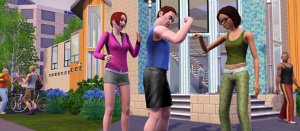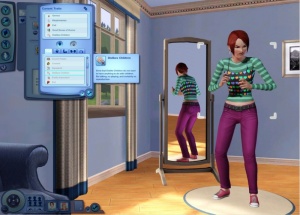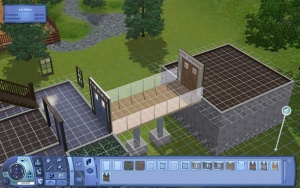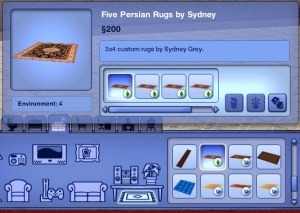The Sims 3
|
The Sims 3 is the third installment of the incredibly popular single-player, life simulation PC game, The Sims. The Sims Studios (developer) and EA Games (publisher) released this much anticipated sequel of The Sims 2 in June of 2009 to rave reviews. It sold over a million copies in its first week alone. [1]
Just as in its predecessors, players create characters called Sims and control their lives with no overall goal. The overarching motto of all The Sims games has been: "Build. Buy. Live." These are also the names of the "modes" in the game. Build Mode allows players to build property in the Sims World; Buy Mode allows players to populate these properties with objects for Sims to use; and Live Mode (the more prominent game player) allows players to control the actions of the Sims they create.
Ethical concerns have arisen in the treatment of the online characters, the actions the Sims are able to make, the problem of addiction to the game, and the ages that have access to this game.
Contents
Gameplay
Create-A-Sim
See also: Avatars
The Create-A-Sim tool allows the player to personalize each Sim’s clothing and physical features. The player has free range to toggle any of the available options for customization or the ability to randomize.
The first step in the process is the Basics tab. Here the player gives their Sim a first and last name and chooses their gender (male or female) and age (Toddler, Child, Teen, Young Adult, Adult, Elder). The Baby age option is only available in Live Mode and accessed through two young adult/adult Sims having a child naturally through the Try for Baby interaction or by calling the Social Worker and adopting a baby. Also available on this tab is the skin color selector. This is a two part section as the player must first pick one of 6 relative skin tones between white, peach, brown, pink, blue, and green. Once this is done they can use the slider to choose a more specific skin color within that particular tone. Finally, the player uses a slider to alter weight, muscle tone, and breast size in female Sims.
The second tab is for editing Hair. Subcategories found under this section include hair style, accessories such as hats or bows, eyebrow style, facial hair for male Sims, and body hair found on the arms, legs, chest, back, and underarms. The color for all of these options is selected at this time as well.
Looks is the third tab in the process. Here the player has seemingly unlimited control over the appearance of their Sims facial features. Sliders and toggles similar to those seen in previous tabs are used to alter overall structure of the head and ears, eyes, nose, lips with the option to go into Advanced mode where they have even more power over the position, spacing, and color of these body parts. Further players can add freckles, beauty marks, age lines, and the like. Also available in the Face tab is the opportunity to give the Sim makeup or tattoos.
Next is the Clothing tab. One or more different outfit for different occasions (Everyday, Formal, Sleepwear, and Swimwear) is pieced together. The game comes preloaded with many choices of separate clothing pieces, full outfits, shoes, jewelry, and glasses that vary depending on the gender and age of the Sim being created. With a little extra effort, the player even has the option to choose a specific hairstyle for each outfit.
The final step of Create-A-Sim is the Personality tab. This allows the player to give Sims personality traits that will affect gameplay such as Slob, Evil, Charismatic, and Heavy Sleeper. Combining Sims with contrasting traits can make households complicated. For instance, a "Neat" Sim and a "Slob" Sim may encounter difficulties living together. In addition to these traits, a Lifetime Wish is chosen. This decision affects the Wants and Aspirations of the Sim during Live Mode. For example, a Sim with the Lifetime Wish of Celebrated Five Star Chef will reach their peak happiness if they reach the top of the Culinary career track. Good traits to match with this would be Natural Good or Green Thumb but some players find humor in giving Sims traits that will only sabotage these goals like Clumsy. Here they can also determine their Sim's favorite food, color, music, as well as their Astrological sign - all of which have minor effects on gameplay during Live Mode.
If two young adult/adult Sims are present in the Create-A-Sim household, the Play with Genetics option becomes available. Through this they can combine the "genes" (all of the settings chosen in the process described above) of both Sims and the output is a child that is the mix of both. The same thing is done if they were to Try for Baby in Live Mode but this way, the player can create pre-existing children and have the ability to choose the gender and age right away rather than having to start from scratch and test their chances. Each household created in Create-A-Sim can contain eight individual Sims. Before completing creation and entering one of the main gameplay modes, the player must place their Sims accordingly on a family tree. They do not necessarily have to be related but any Sims below the Young Adult age level must live with a parent or blood relative.
Build
Although there are pre-built homes available for Sims, a player may choose to design and build their own home for their family. Build mode involves building the actual structure of the house including walls, flooring and other building elements, as well as the development of the land on the property and certain landscaping measures. This includes pools. fences, fireplaces, fountains, shrubbery, natural water like ponds, and even changing the level of the land itself. Build mode makes available numerous architectural and interior design options for the player to use, but for a price. However, cheat codes for more funds can make the more extravagant options more readily available. At the player’s prerogative, a family of Sims can live in an enormous mansion on the beach or a one-room house in a normal neighborhood.Players can also build commercial properties such as malls or parks for their Sims to visit. Commercial properties are given unlimited funds, but the quality of any venue is up to the player.
Buy
Buy mode is where players furnish the homes and lives of their Sims with The Sims' own currency Simoleon once the basic structure of their environment has been completed in Build Mode. Necessities, such as refrigerators and beds, and luxuries, such as decorations and entertainment devices, are all bought in buy mode using the Sims’ household funds. These funds can be earned through Sims’ work, cheat codes, or selling unneeded items.This mode is can organized in two different ways: By Function or By Room. In the former, categories such as Entertainment, Comfort, Party, Decor, and Miscellaneous are seen whereas in the latter, items are delineated between Bedroom, Kitchen, Bathroom, etc. The objects found in Build Mode not only furnish the lives of the Sims but often times provide special interactions or ability to gain certain skills. Since it is very crucial for young Sims to be enriched and learn a lot from Baby-Teen (their success in life and school during these times determine their future traits and Lifetime Wishes), the particular items in their home can have a large effect on their lives and relationships - for good or bad.
Live
Sims have the ability to advance to up to seven age-levels before eventually dying of old-age - that is if they do not die from unnatural causes throughout the course of game progression.
During Sims’ lives, Sims behave much like the human controlling them. Toddlers are potty-trained and taught to walk and talk by their parents. Children and Teens attend school Monday through Friday and do homework. Teens can acquire a part-time job to make some money after school and even start exploring the dating world. Young adults and adults can fall in love, marry, and have babies. Elders can retire and enjoy the spoils of their success.
Time passes at a rate of one second in real life to one minute in the game. Following from this, 60 seconds in real life is one hour in the game and so on. While time passes in this way during Live mode, time freezes in both Build and Design mode. The player has the ability to pause, play, fast forward, fast forward x2, or fast forward until the current Sim's task is completed.
While the game itself does not have a specific end purpose, there are the built in Mood and Needs meters that imply the goal of being kept high or in the green. The Mood meter for each Sim is determined by a combination of internal and external causes that are displayed to the right and which include such things as Nicely Decorated Room, Exhausted, or Feeling Lucky. Each of these causes are given a short explanation so that they can be remedied - for example, if they are Disgusted (from being smelly after working out) the player can have them go take a shower and it will disappear resulting in a better Mood. The Needs meters work in a similar fashion but are much broader. Just like real life humans, the basic Needs of every Sim are Hunger, Bladder, Energy, Social, Hygiene, and Fun. These bars are constantly fluctuating and keeping them in the green is directly correlated to a higher Mood. There are negative consequences for letting Needs meters enter the red zone including bathroom accidents in public, going stir crazy, and even starving to death. Social workers will step in in extreme cases if this happens to a Sim from Baby-Teen age. Another way to improve the life of a Sim is having them complete actions that pop up in their Wants. Often these actions are aligned with achieving their Lifetime Wish but they can also be as small as having a chat with their mother. The player can choose up to four Wants at a time to lock in that when they are completed earn the Sim Lifetime Achievement points that can be used to buy social objects to help them advance towards their Lifetime Wish. This choice, on the other hand, allows the player to ignore certain wants of the Sim that they do not want them to go through with. At a very basic level the Wants feature provides the player with ideas of what to do during gameplay if they are looking to spice up their experience but is not limiting in any way as there are no consequences necessarily from ignoring them all together. The implicit goal of keeping a Sim's levels high is clearly supported by certain game mechanics (unhappy Sims are not easy to control) but it is not the only way to play. Many players find great fun in creating worst case scenarios for their Sims and doing the exact opposite of everything the Sim wishes to do.
Other features of the Live Mode interface include viewing one's Simology (name, traits, Astrological sign, family tree, favorites, age meter [how close they are to aging up a level], and scrapbook [place to save screenshots and memories of achievements]), Relationship levels with every Sim they are acquainted with, Career/Education information, Inventory (Sims can carry books, musical instruments, groceries, cell phone, etc. on them), and Opportunities.
Sims can also gain skills, making gameplay more interesting. For example, Sims can take cooking classes and read cooking books to increase their cooking skills and gain the ability to prepare fancier meals than Sims with lesser skill. The advantage of having cooking skills is that the Sims' meals will be more satisfying and help feed their needs more than normal to keep them happy. Without certain skills, your Sim is more likely to cause accidents such as starting a fire when cooking or being electrocuted while fixing the TV. These skills are also pivotal to careers around town. For example, Sims in the military and police careers need a large amount of athletic skill to advance. Having a higher skill level means being promoted in a career track and thus, bringing in more money. The skills available to gain include Charisma, Collecting, Cooking, Fishing, Fitness, Gardening, Guitar, Handiness, Logic, Painting, and Writing each containing 10 levels of their own.
A Sim’s relationships with his family and neighbors is also an important part of the game. Just as there are there are friends, lovers, and enemies in real life, these relationships exist in The Sims 3 as well. Sims with jobs have bosses with whom they'd be wise to maintain a good standing. Sims are also able to form a committed romantic relationship with one Sim, such as “going steady” or marriage, and have affairs with other Sims. However, there are consequences if the victim witnesses this betrayal. Interacting with other Sims gives you actions you are able to perform. These can be both friendly and unfriendly and change with the Sim's age and the relationship status they have gained with the other Sim. Interactions with other Sims depend on previous relationships, family affiliation, mood, appearance, environment, and the traits of both individuals. Sims with similar interests and traits will be much more compatible in the long run.
It is completely up to the player how they want their Sims to live out their life. They can be family oriented with a steady job, loyal spouse, and tons of kids or they can be the town maniac running around the park screaming nonsense or they can take them from birth through multiple jobs and relationships before becoming a world famous rock star playing stadium shows. No matter how it all plays out, all Sims eventually meet their demise. Whether it is natural causes as an elder or a freak accident as a young adult, the Grim Reaper comes for them all eventually. After seen doing a bit of paperwork, the Grim Reaper will disappear along with the Sim leaving a gravestone or urn in their place. Said Sim's friends and family will mourn for some time but soon move on with their respective lives. However this does not always mean they will never see their loved one again as it is common for ghosts of Sims past to appear in the graveyard when the sun goes down. Living Sims are able to communicate and form relationships with ghosts - as long as they are not too afraid.
Create-A-Style
A new feature that was not seen in the previous titles of the series is introduced in The Sims 3. This is the Create-A-Style button. A paint brush and palette icon denotes this new tool that allows the players to go much deeper into the customization of an object than ever before. While the game limits the types of objects that Sims can wear or interact with, this option gives a little more freedom in the style, color, etc. of those for more variation across the board. The button can be seen in almost every mode of gameplay from editing the precise color tone of hair to changing the wood of a dresser to match the bed frame. Create-A-Style does not alter the way the game itself is played but can make it more enjoyable for the more creative or finicky player.
Expansions
The previous Sims games (The Sims and The Sims 2) were limited in ways to customize Sims. While The Sims strictly restricts Sims to pre-made outfits, faces, and hairstyles, The Sims 2 began to allow players to choose these. A more complex Create-A-Sim avatar creator similar to the one in The Sims 3 was introduced as well as Aspirations, Fears & Wants, and Lifetime Points that serve as predecessors to some of the features found in this installment. Also, with the release of The Sims 2, developers allowed the exchange of Sims through the game's website.[2] The area of the website in which players share their Sims is called "The Exchange." A player creates a Sim that they are proud of - using the create-a-sim tool in the game - and shares it for other players to download.
However, using mods from private websites, users can add new clothing, hairstyles, and accessories to their individual games. When a Sim with these mods are shared through the Exchange, the mod is shared as well. Mods are the alteration of content from a video game in order to make it operate in a manner different from its original version. Mods are popular in role-playing games and are another way a player can spice up The Sims and make it more interesting. Often times, the third-party game modifications are more stylish and desired than the clothing offered with the game. One of the most popular private exchange websites is The Sims Resource (TSR) [3]
Due to the popularity of mods and The Sims 2 Exchange, The Exchange returned for The Sims 3 along with The Store, offering premium content from the game developers for currency called SimPoints. A number of SimPoints are given to new players, but new SimPoints are bought using real money.
Expansion Packs
The Sims 2 franchise has released 8 expansion packs. These packs include: University, Nightlife, Open for Business, Seasons, Bon Voyage, Pets, Free Time and Apartment Life. Each pack revolves around a common theme, complete with new neighborhoods, objects and non-playable characters to support the theme. [4]
For example, in University, Sims can attend college as part of the aging process. The game becomes built around university, through having "rewards" and "aspirations" of each Sim centered around college. Whereas in Nightlife, this pack focuses on adding a downtown filled with restaurants, shopping centers and night clubs to allow Sims to relax and have fun. These expansion packs can be played simultaneously or separately to add to the overall gaming experience.
The franchise has also released a "Stuff" Packs. These include: Celebration, Family Fun Stuff, Glamour Life, H&M, Happy Holiday, Ikea Home Stuff, Teen Style and Mansion and Garden. Each pack comes with an array of new items for Sims to use. Items range from clothing to makeup to wallpaper patterns to furniture. [5]
In addition, there is an expansion pack called Sims 3 “Late Night” Expansion, which adds more social and party options to enhance your Sim’s social personality and popularity. An expansion pack is an addition to an existing role-playing game, which provides new game areas and additions to an extended storyline to complete and already released game. Players usually use expansion packs to make their current game more interesting. The “Late Night” Expansion is connected to the released game where a user can transfer his Sim character in Sims 3 to the expansion pack. However, in the “Late Night” Expansion, a user can recreate my character’s personality, life goals, and storyline. In the “Late Night” Expansion, a user has options to throw various types of parties: house parties, birthday parties, gift giving parties, pool parties, and costume parties. In order to create a house party, the user has to set the start and end time and his guest list which was either randomly chosen for him or through friends he has made in Sims 3.
Ethical concerns
In its most popular PC form, The Sims 3 is a single-player game. However, as a human life simulator, the game can still be used to discuss real-world ethical concerns. The design of the game allows for the possibility of setting up and playing through a simulated world of moral ambiguity. Players can perform psychological experiments using Sim characters as subjects without considering real-world ethics. Although the outcomes of these experiments do not have an effect on the real-world, they can provide insight into the happenings that may occur if human ethical code allowed for such studies to persist in the real-world. [6]
Free Will versus Complete Control
In the options menu, there is a slider called "free will" that controls how much the player must control the Sims of their household. At the highest free will Sims will fulfill their physical and social needs on their own, while at the lowest, Sims may die if left unattended. When choosing the lowest free will setting on the game, there there are various ethical concerns such as whether neglecting to help the Sim survive via ignoring it is ethical. For example, the ethics on a user allowing all of their Sims to die with the intention of making a graveyard may be a moral reflection upon the user. It has been argued that avatars are extensions of oneself into the virtual environment and therefore have universal public morality. Leaving them unattended under the conditions of free will could therefore be considered unethical.[7]
Good Sims and Bad Sims
Left with the game’s autonomy are Sims who perform unethical or ethical actions. This raises some questions such as whether the Sims who carry out unethical behaviors are morally wrong such that this could be an example of artificial agents being held responsible for their actions.
Because players can give traits to their Sims using the Create-A-Sim tool, this leads to concern of who is ethically to blame for the actions of a Sim who has been given the “Good” or “Evil” trait. Luciano Floridi argues that it's the agent's fault, while others argue that the user is in control of choosing the traits, not the game or Sim itself.
Video Game Addiction
In the real world there is also a matter of the amount of time users are on this game. In one episode of the television show "Wife Swap", a mother ignores her children all day and plays The Sims. When the virtual world takes over the real world there is the question of whether the game or the player is at fault.
It is easy to spend hours living the lives of Sims. There are no goals that, upon completion, signify the end of the game or a good time to stop playing. The only time the game "ends" is when every member of the active household dies; given there are few accidents and all Sims aren't old, this could take a long time.
Motivation is one of the key aspects to keep a player interested in playing a game. All opportunities in the game gives Sim rewards. The opportunities are split up into 3 categories: 1) career 2) skill 3) special. Examples of opportunities is allowing your Sim to learn how to play an instrument, doing dishes after they eat, or decorating a house. Extrinsic motivations would be a player allowing his Sim to take advantage of these opportunities since there is a want to make money, get an increase job performance to fulfill his Sim’s life goal, and boost social and relationship status with other Sims in the game. Another extrinsic motivation would be wanting his Sim to do well in the game just as how he would want to perform well in real life.
In terms of intrinsic motivations, a user is motivated since there is an uncertain outcome with choices made in the game, such as wanting to set dream life goals, pure curiosity, and self-esteem. Your Sim in the game is a reflection of who you are a person. Even if you create a Sim that is not like you in real life, your Sim is still made with thoughts of who you may want to be. It brings up a player's self-esteem to see their Sim ending up happy and fulfilling its life goal.
Inappropriate Content for Children
The Sims franchise allows players to play a Sim over his or her life course. During this time, as the Sim grows from adolescence to adulthood and beyond, the Sim can engage in activities and interactions that come with aging. For example, teenage Sims can engage in romantic activities with other Sims and adult Sims can become pregnant through related sexual activities. One could make an argument that Sims characters engaging in sexual activities is a form of Virtual Pornography and is not suitable materiel for younger users to witness in a virtual environment. Sims can also start violent fights with other Sims and even work in the criminal field, stealing objects for a living. Although The Sims is rated for Teens, most people of any age group can easily obtain access to it or watch others play the game. Even if Sims 3 did not offer sexual activities in the game, players can find mods such as Woohooer, which makes the Sims 3 game less PG-13 and more rated R. Wooher allows the Sim character to be frisky and naughty. A player can send "woohoo" texts and pictures to other Sims character and you can even allow your Sim to hire a stripper. In addition, you can also allow your Sim to engage in unprotected sex, which could lead to real life consequences if a teen is not educated. This can raise ethical dilemmas: is it appropriate for minors to have their Sims engage in sexual activities? Is it also appropriate for them to begin fights with other Sims because it is part of a fun game?
Cheating
In The Sims it is common to employ cheat codes to gain advantage within the game. It is difficult to Build and Buy things in the game with the insufficient funds provided at the start. Users employ cheats to speed up the process of creating a dream home and environment for their Sims. There are also cheats that exist for silly reasons, one example being "jokePlease" which posts a silly joke onto the screen at random. Other cheats exist as well to increase Sim happiness levels, construct impossible structures, become friends with other Sims, gain work opportunities, or accomplish many other goals you may wish to fulfill. The Sims 3 has a "cheat bar," toggled by pressing varying keys depending on the system you are using. A well known cheat code to acquire easy money is "rosebud !; !; !; !; !;" With each "!;", 1000 Simoleons are added to the player's funds. [8]. Another cheat code where your Sims can never die in the game is to go to the gate of Pleasant Rest Graveyard and find a bush called "Death Flower Bush". If you harvest the bush and keep it in your inventory, your Sim will never die.
According to Mia Consalvo in her piece "Gaining Advantage: How Videogame Players Define and Negotiate Cheating," using cheat codes are one way of 'hitting fast-forward' to speed through a game. Users can more easily advance their Sims in the game when they have unlimited funds from cheat codes. However, this kind of cheating is a way of gaining unearned benefits. One group of players "acknowledge that items such as cheat codes are readily available and accepted in some quarters, but the reconfiguration of game code is the central key to what constitutes cheating for them." They do not necessarily have a problem with walkthroughs, tips from other players, or other outside elements, but instead see cheating as the point when a player changes the configuration of the game itself, altering it through the code [9].
As The Sims is meant to be a virtual environment reflective of real life communities, cheating makes this reflection a poor portrayal. Some younger naive players may imagine that The Sims community is what life is truly like when it comes to building a community and buying components of it. With the ability to cheat in order to increase one's funds instantly, a player may get the idea that money grows on trees. This is sending the wrong message to players in that they may think no work or effort needs to be applied in order to make or receive money. If players do not receive lessons on worth ethic elsewhere in their lives, they may never learn the concept and grow up thinking they will have unlimited access to money. However, some players are more aware of the virtuality of the game and know that life does not actually work the way it does in The Sims.
Sometimes, using cheat codes in the game can be a good thing; it can give aid to those who are stuck or help them get past a difficult scenario that caused substantial frustration.
See Also
- The Sims Online
- Ethics in Computer & Video Games
- Pornography
- Virtual Environment
- Virtual Child Pornography
- Women in Gaming
References
- ↑ Wikipedia. "The Sims 3." Retrieved on 16 April 2016.
- ↑ The Sims 2. "The Sims 2 Exchange." Retrieved on 16 April 2016.
- ↑ The Sims Resource. "The Sims Resource." Retrieved on 16 April 2016.
- ↑ Computer Sims Games. "The Sims 2 Expansion Packs." Retrieved on 16 April 2016.
- ↑ Computer Sims Games. "The Sims 2 Stuff Packs." Retrieved on 16 April 2016.
- ↑ Seanbaby."The mysteries of the mind with the Sims." 11 June 2009. Retrieved on 16 April 2016.
- ↑ Spence, Edward. "Meta Ethics for the Metaverse: The Ethics of Virtual Worlds." 24 June 2008. Retrieved on 16 April 2016.
- ↑ TheLighterDark. "Sims 3 CHeat Sheet." 3 June 2009. Retrieved on 16 April 2016.
- ↑ Consalvo, Mia. "Gaining Advantage: How Videogame Players Define and Negotiate Cheating." 2009. Retrieved on 16 April 2016.






